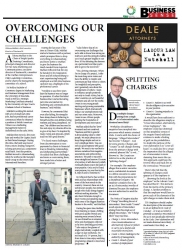Patrick Deale - Splitting Charges2018-07-12 Patrick Deale, Labour lawyer & mediator
Do multiple charges arising from a single act of misconduct make dismissal more likely? Workplace disciplinary enquiries have morphed into processes which mimic criminal trials. It starts with the choice of language. “Alleged Misconduct†has become “Chargesâ€. And for extra gravity, Charges add “Counts†as sub-charges flowing from the primary Charge with criminal phrases like†to wit…†thrown in. The Counts are referred to as the practice of “splitting chargesâ€. For example: The employer alleges that a senior executive sent a confidential document to a fellow executive to assist him with his preparations for a disciplinary enquiry. The employer considers this to be an act of misconduct worthy of dismissal because the employee was not authorised to send the document. The Notice of Enquiry attaches a “Charge†describing the act of misconduct. Then it adds “Counts†as sub-species of misconduct arising from this single act of alleged misconduct. The “Charge Sheet†may read thus â€"
No doubt the purpose of the over-elaboration is to “cover all basesâ€. It could also be to create the impression that the alleged act of misconduct is more damning than meets the eye. This approach could have the reverse effect and back-fire on the overzealous “Prosecutorâ€. There’s the risk that the splitting of charges could appear as if the employer is “… throwing the book at the employee†as the Labour Court has described it*. This detracts from the merits of the primary charge. A further problem is that the employer would have to prove each of the elements of the split charges to make them stick. TIP: Employers should confine the description of the misconduct to an act defined in its Code of Conduct â€" or to an act which is generally accepted as misconduct if the act is not specifically referred to in the Code. Over-elaboration will not make dismissal more likely â€" it could make it less likely. *Specialised Belting & Hose (Pty) Ltd v Sello NO & others (LC case NO JR3136/05, judgment 6 February 2009) Offices in KZN and Johannesburg C: 083 375 8771 E: patrick@deale.co.za www.deale.co.za |
Patrick Deale - Splitting Charges
Copyright © 2026 KwaZulu-Natal Top Business
